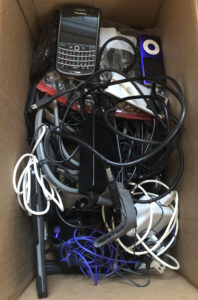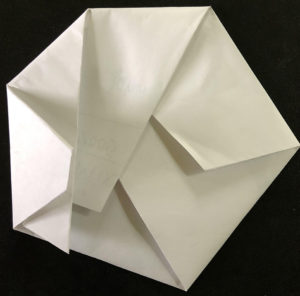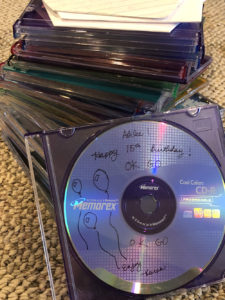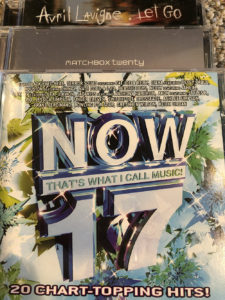Zero Waste Decluttering: Recycling Old Electronics
This is the first in a series of posts about decluttering without contributing to more waste by trashing unwanted things. The adage, “One person’s trash is another person’s treasure,” can be the mantra of eco-friendly cleaning house. Some suggestions to greenly get rid of things you no longer want are really obvious, like donating used clothing to Goodwill or a homeless shelter. However, much of the junk we accumulate isn’t easily reused or recycled, and so that’s what this series will focus on.
I’ve been on a kick to declutter my house recently. My attic and basement have become crowded with boxes and stuff piled in each corner, and I’m finally fed up with the overflowing piles and lack of organization. Getting rid of stuff feels good – your life seems less crowded by little things taking up your attention. And a bonus is you don’t have to do acrobatics to walk through your basement. I want to rid myself of the excess stuff, but I do not wish to dump it all in a landfill. My goal is to avoid throwing out as much as I can, so it requires some research and storing of junk until I can find somewhere more suitable than the trash to put it.
How many of you have this tangled mass of old cords to who-knows-what, ancient cellular devices and outdated music players with no hope of ever using again piling up in your house?

Old electronics are a big issue that clutter homes and pile up in landfills. Planned obsolescence is pervasive across many industries, and especially in tech – items are made to be discarded and bought anew, not kept and repaired. Technology companies are constantly coming out with new products and the devices we had several years ago are far inferior to the ones now. The average time consumers keep their cell phones is 2-3 years due to reduced performance. I’m not big on buying the next big tech trend as soon as it comes out, but somehow I still end up with a new iPhone every few years. One way to prevent waste is to not buy new technology unless absolutely necessary – a cell phone takes a dip in the toilet, for example (this may have happened to me a couple of times…). But for all the times we feel are necessary to purchase that upgrade, we can make a conscientious effort to recycle our old tech.
Many municipalities offer electronics recycling, some of it free and some with a cost. There are usually certain days of the year that items are accepted and drop offs are only open to residents. These are highly specific to your community, so check with your county or township. The Chester County Solid Waste Authority has information on recycling on their website for various locations in Chester County that accept electronics. Best Buy stores also offer electronics recycling. This service is free; however, you can only recycle up to three items per household per day according to their website. They recycle various things, from TVs, computers, cellphones, and cameras to printer ink, GPS systems, vacuums, hair dryers and curing irons. For ink and toner recycling, they even offer an incentive of $2 savings on your next ink purchase of $40 or more and $2 saving on your next toner purchase of $100 or more (it’s not much, but every little bit counts, right?). I was quite surprised by the list of items that they do take – it’s quite extensive. They also accept items purchased from any retailer, and are doing what other competitors are not. This makes me want to shop at Best Buy more!
However, there is one thing Best Buy does not take that I have need to get rid of: CDs. Digging in the black hole of my attic, I found so many old CDs. Some were purchased but most were burned playlists. I forgot that people used to give birthday CD mixes or make CDs for long road trips. Remember running out of CD cases and making some out of paper? Commercially produced CDs (as well as DVDs, records, and tapes) are accepted at Goodwill locations as long as you have the original case, as these can be resold. Search for the Goodwill serving your area here to see what they take: Find a Goodwill near you. (Some Goodwill locations also collect old computers with the Dell Reconnect program.)
I have far more burned CDs of songs that I either no longer listen to or could just pull up on Spotify well as cases to go along with them. I did some googling, and Earth911 suggested either GreenDisk or the CD Recycling Center of America. Donations to the CD Recycling Center of America have to be separated into cases, discs, and paper inserts (but I would just put the paper in my curbside recycling). Both recycling centers also take a variety of other electronic waste, like cell phones, inkjet cartridges, and DVDs. GreenDisk appears to take a lot more than the CD Recycling Center of America (see the table at the bottom of this post) and advertises secure disposal of intellectual property contained on your “technotrash.”
The CD Recycling Center of America describes their recycling process for paper, cases, and discs. The paper from case inserts is sent to a paper mill for recycling. Cases in good condition can be packaged and re-sold, while damaged cases are sent to a plastics recycling center. Discs are ground into pieces which are then liquefied and the metal is removed. The demetalized plastic is used for raw plastic in the automotive and building industry. They do not specify what happens to the metal removed from discs.
GreenDisk pledges that over 99% of the materials collected are reused or recycled and no hazardous materials are sent overseas, which is a big problem with electronic recycling. Much of our unwanted electronics are sent overseas to areas with little environmental controls or worker safety. The recycling process can release hazardous compounds if not controlled, so the fact that GreenDisk tries to eliminate technotrash sent to third world countries is a good quality (1). The tech products are refurbished while the remainder is recycled by nonprofit organizations. Cell phones are sent to a remanufacturer if they are functioning, printer cartridges are either sent to a remanufacturer or recycled if they cannot be reused. They detail their process in a white paper on their website.
I was curious how the current recycling crises in America are affecting both of these CD/electronics recyclers. I reached out to both companies for comment on how much they are still able to recycle. While I heard nothing from the CD Recycling Center, I heard back almost immediately from GreenDisk. The original author of the white paper replied to me and said that while most of their processes are still the same, the majority of items they receive are recycled instead of reused as there is less demand for older technologies like CDs. They can still recycle polycarbonate (CDs/DVDs), polystyrene (CD jewel cases, outside shell of audio/videotape), and polypropylene (DVD cases, plastic videotape cases). Unfortunately, the tape itself from videotape/audio cassettes are no longer recyclable, so they began incinerating them to convert them to energy. However, they found that this was worse for the environment than putting them in a landfill, so the tape itself is landfilled. GreenDisk continues to partner with non-profits that hire workers with disabilities for sorting and grinding plastics. Once sorted and ground, the plastics are shipped to largely U.S. manufacturers, which are then integrated with virgin material and made into new products.
The CD Recycling Center of America seems easier to use – they post their address on their website. The service is free, but they recommend a donation of 2 to 5 cents per disk in order to keep it free. CD’s need to be separated for recycling into paper, discs, and cases. Case trays should be removed from the case itself. They do accept popular retail CDs and movies without disassembly, as these will be re-sold. You must pay for shipping your package to the recycling center.
GreenDisk (as of 2020) charges $11.95 for their Pack-IT service for shipments under 25 lbs, with the option to purchase additional weight ($0.45/lb over 25 lbs). This is in addition to the cost of shipping things to GreenDisk. After purchasing, you receive the address to mail your package. Based on the positive response I got from GreenDisk and their commitment to environmentally sound practices, I intend to purchase their Pack-IT service and accumulate enough electronics and old CDs to make it worthwhile between friends and family.
Do you have CD’s or other old electronics you want to donate? If you would like to contribute and are in my area, please let me know in the comments so we can combine shipments! Otherwise, try starting a collection with friends and family to split the costs of shipping or make semi-regular trips to Best Buy. 🙂
Happy Decluttering!
(1) Williams, E. Environmental effects of information and communications technologies. Nature 479, 354–358 (2011). https://doi.org/10.1038/nature10682
List of items accepted:
| Green DiskAccepted Items | CD Recycling Center of AmericaAccepted Items |
|---|---|
| CDs, CD-Rs, CD-RWs, DVDs, Blu-ray, 3.5" and 5.25" floppy discs, zip and jazz disks, and cases | CDs, CD-Rs, DVDs, DVD-Rs, Blu-Ray Discs Disc packaging and cases |
| Inkjet cartridges and toner | Inkjet cartridges |
| Small electronics | Small electronics |
| Cell phones, pagers, PDAs, chargers, cradles, and headset accessories | Cell Phones |
| Miscellaneous items | Christmas lights |
| VHS, audio cassette tapes, DAT, DLT, Beta, and Digibeta | N/A |
| Computer drives | N/A |
| Film | N/A |
| Batteries | N/A |



